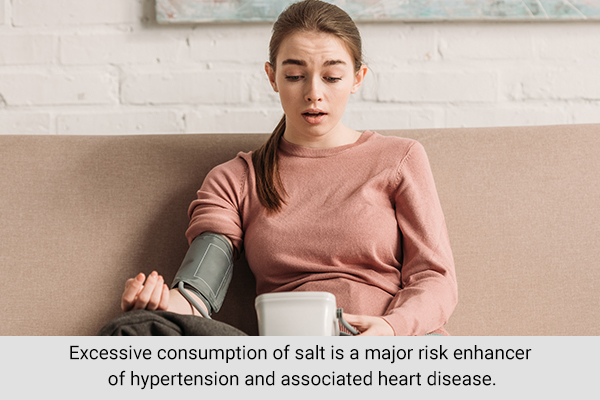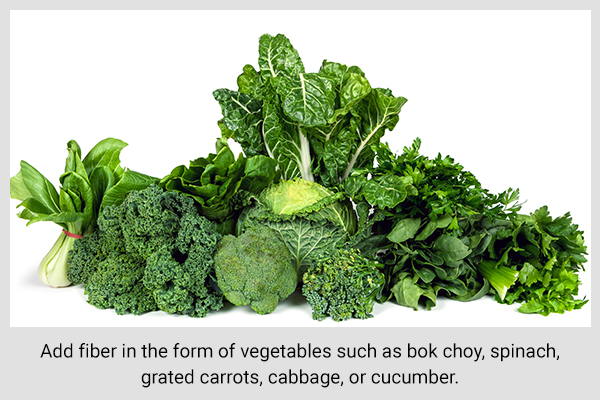In this article:
Instant noodles or ramen have become one of the most popular meals around the world. Countless brands and varieties of these ready-to-cook meals can be found in every grocery store nowadays.

Unfortunately, instant noodles happen to be incredibly unhealthy. They have very low nutritional value, are loaded with preservatives, and have high carb content. Many people consume them regularly without any awareness of their health risks.
Take a deeper look at the harmful effects of instant noodles below. (1)
Harmful Effects of Instant Noodles
Here are the possible health risks associated with instant noodles.
1. Increased chances of heart disease
A study published in a leading nutrition journal has shown that regular consumption of instant noodles can lead to metabolic diseases such as diabetes, obesity, hypertension, and heart disease in women.
Women who consume instant noodles twice or thrice a week are at high risk of suffering from a heart attack or stroke. The reason is the high amount of fat and oil required in the processing of these noodles. (2)(3)
2. May raise blood pressure

Instant noodles contain very high amounts of sodium. (4) Excessive consumption of salt is a major risk enhancer of hypertension and associated heart disease. (5)
3. May contain monosodium glutamate
Many instant ramen brands use monosodium glutamate (MSG) as a flavor enhancer. MSG can be incredibly harmful when consumed in high amounts. It can lead to obesity, hypertension, heart issues, etc.
MSG also contains glutamic acid, (6) a neurotransmitter. Hence, it can interfere with the processes of the nervous system. (7)(8)
4. May cause hormonal imbalance
Instant noodles contain harmful preservatives such as butylated hydroxyanisole (BHA) and t-butylhydroquinone (TBHQ), which prolong their shelf life.
However, both these chemicals have been found to be carcinogenic in research studies. TBHQ is a proven carcinogen, while BHA can mess with your hormones and cause further complications. (9)
5. May cause indigestion

Instant noodles are difficult to digest and can be very hard on your digestive system. Your stomach and intestines have to work extra hard to break down these noodles. Hence, they are also retained in the stomach longer than required.
Regular consumption of these noodles can have adverse effects on your digestive health and can lead to bloating, inflammation, reflux, acidity, etc. (10)
6. Can cause weight gain
It is well-known that saturated fats are bad for health. Instant noodles are very high in this type of fat.
Saturated fats can increase the levels of LDL (bad) cholesterol in the body, clog your arteries and lead to heart issues, and cause unhealthy weight gain. (11)
7. Offer low nutritional value
Instant noodles are usually made of refined flour, which is a very low-nutritional-value product that contains almost no fiber, minerals, and vitamins. It is loaded with starch that can cause obesity, heart disease, diabetes, etc., when consumed regularly. (12)
Expert Recommendation

Instant noodles are a hot favorite among college students and office workers living on their own. While there are associated health risks, the convenience of such a meal cannot be denied.
If you do consume an instant noodle meal, you can do a few things to boost its nutritional value:
- Add protein, which can be a boiled or fried egg, tofu, cheese, paneer or cottage cheese, or a handful of sprouted beans.
- Add fiber in the form of vegetables such as bok choy, spinach, grated carrots, cabbage, or cucumber.
- Boil and drain the noodles to get rid of the unhealthy fats and instead add healthy choices such as sesame or olive oil.
- Boost micronutrient and probiotic content by consuming instant noodles alongside pickled vegetables or kimchi.
In addition, you can look for low-sodium noodles to protect yourself from the harmful effects of excessive sodium.
Are Ready-to-Eat Meals As an Alternative to Instant Noodles Good for You?
No, ready-to-eat meals are also very low in nutritional value and do not have much health benefits for you in the long run.
Final Word
Processed foods are devoid of nutrients and minerals required for growth and proper functioning of the body. Try to avoid them as much as possible.
Fresh, whole foods such as fruits, vegetables, meat, and grains remain the best food sources for a healthy life.
- Was this article helpful?
- YES, THANKS!NOT REALLY


